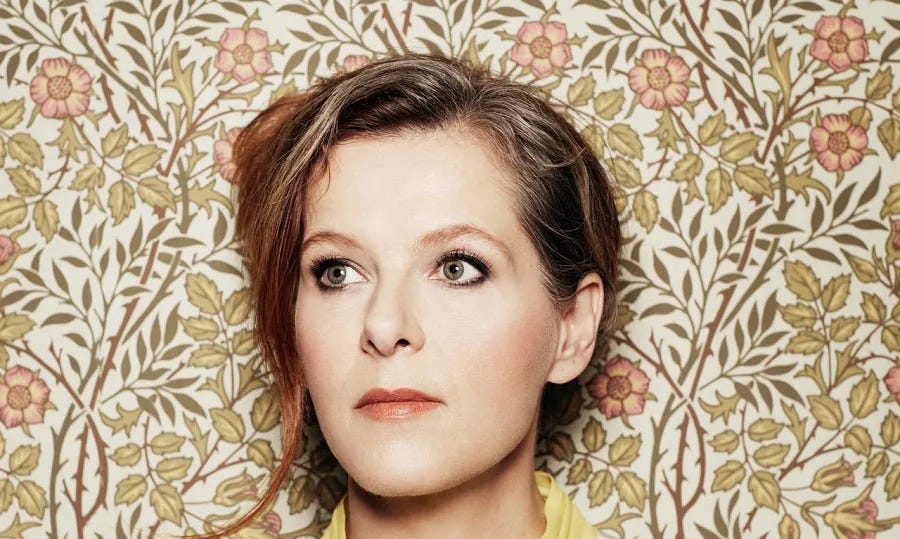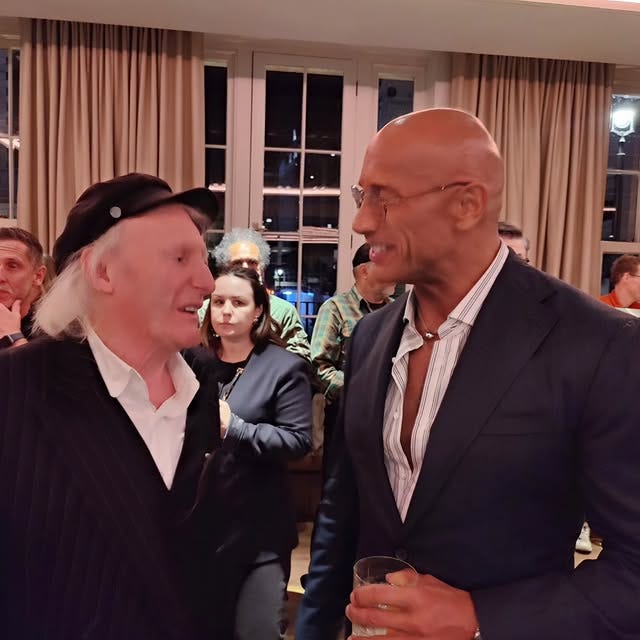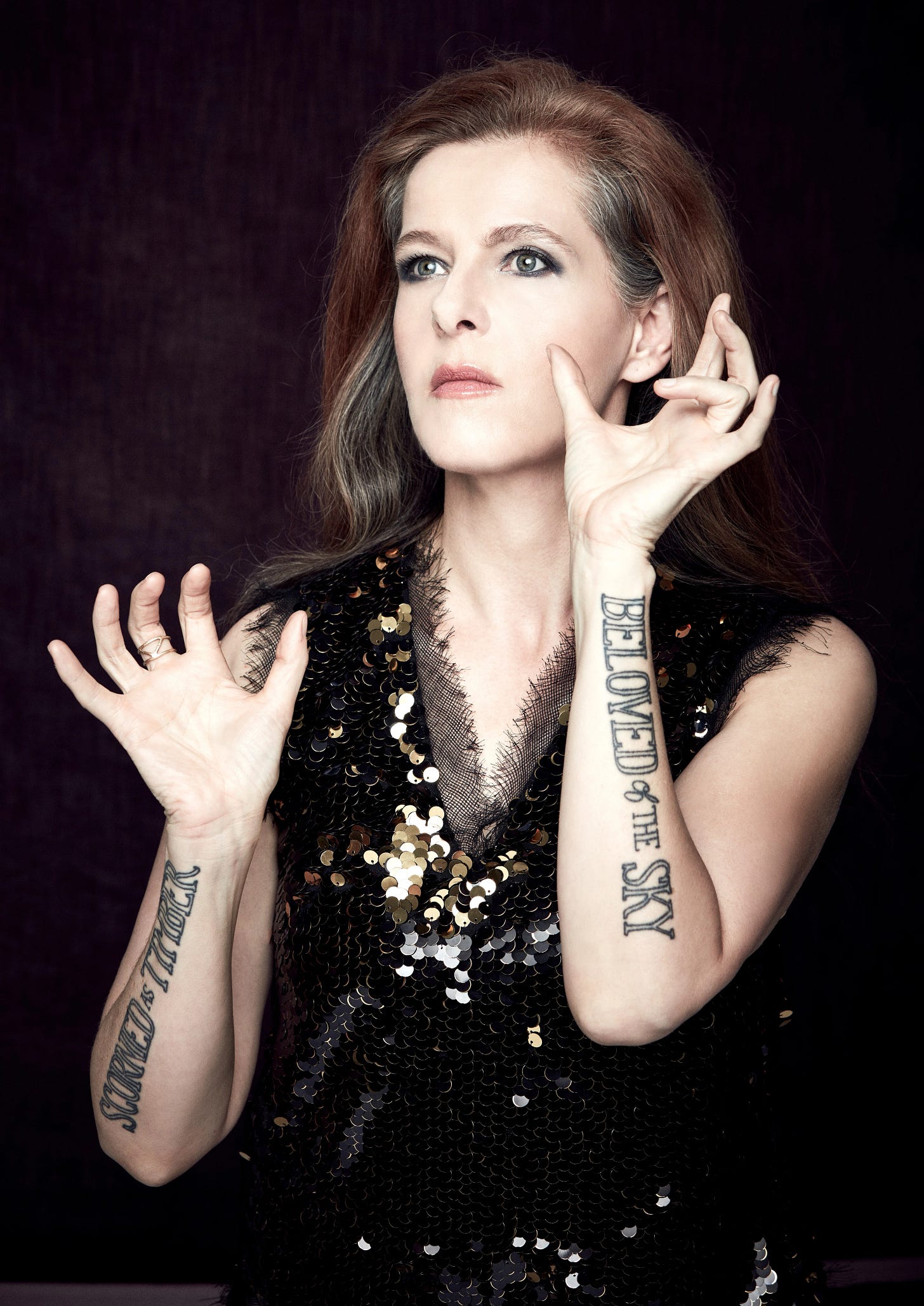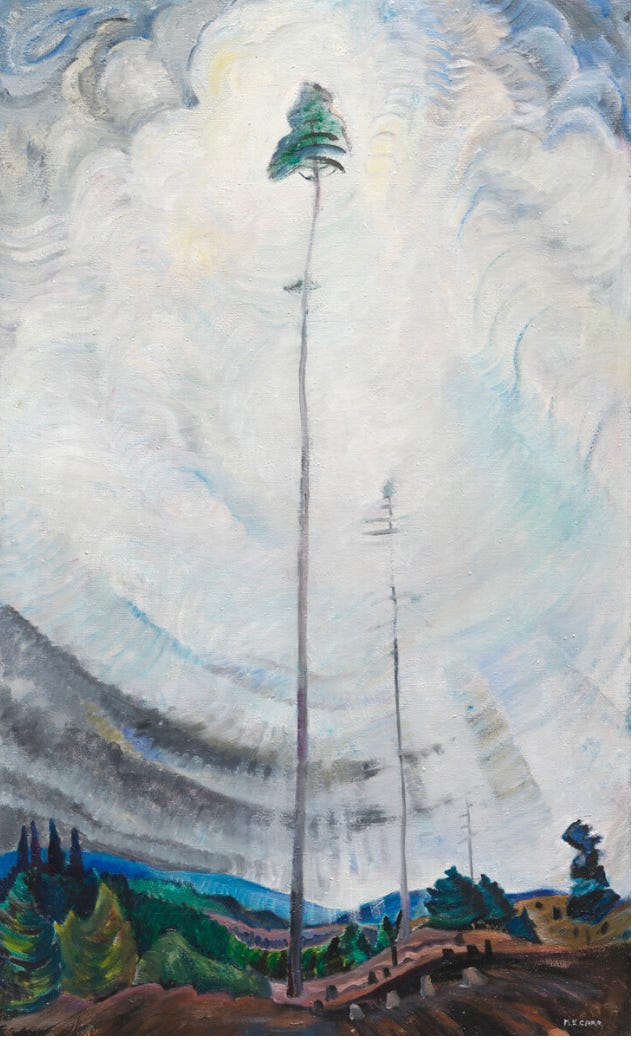A conversation with Neko Case from 2013
The indie-country singer talks about getting her first tattoos, joining Twitter (back when it was fun), and the mundanity of mourning
Welcome to stübermania, where I dig into my box of dust-covered interview cassettes from the 1990s and 2000s (and crusty mp3 files from the 2010s) to present bygone conversations with your favourite alterna/indie semi-stars and the occasional classic-rock icon.
This is a newsletter in three parts: The Openers (links to recent writings, playlist updates, and/or other musical musings), The Headliner (your featured interview of the week), and Encores (random yet related links).
This is a free newsletter, but if you really like what you see, please consider a donation via paid subscription, or visit my PWYC tip jar!
THE OPENERS
You might think this photo of Cleaners From Venus mainman Martin Newall and Dwayne “The Rock” Johnson is the result of a joke prompt that some cheeky bastard typed into Midjourney, but it’s real and it’s spectacular:
Few musicians can claim they’ve played in one of the greatest rock bands of all time; Kid Congo Powers has played with three of them—The Gun Club, The Cramps, and The Bad Seeds. For the past two decades, the ever-dapper Kid has been fronting the less renowned, but no less raucous Pink Monkey Birds, who rolled into Hamilton’s Bright Room last Friday for a set of Chicano rock ‘n’ soul rippers and garage-punk classics (like the one captured below) that proved 66 is the new 16:
Last weekend, we got hit with the sad news that DJ/producer/musician Alphonse Lanza III has passed away. Alphonse—a.k.a. Alixander III—was best known as co-founder of the Toronto house supergroup Azari & III, who, for a moment there in the early 2010s, seemed destined to reach the top rows on international EDM-festival posters, but flamed out as quickly as they blew up. Lanza went on to front the short-lived mod-rock outfit The Cruelty Party before decamping to Mexico in his later years. His cousin and fellow electronic artist Jessy Lanza posted this tribute to her Instagram, and below you’ll find my testimonial to Azari & III’s eternally fierce debut that was slated for inclusion in a Best Canadian Electronic Albums of All Time listicle for Vice’s dance site Thump in 2018 (but never ran due to sudden budget cuts). Rave on, Alphonse.
Like any cosmic collision, Azari & III burned brilliantly bright for a moment before evaporating into the ether without warning. Despite what their duo billing suggested, they weren’t just another production partnership larding up with their recordings with random features, but a rare proper dance group seamlessly fusing their divergent backgrounds and personalities. On one side you had DJs Christian Farley (a.k.a. Dinamo Azari) and Alphonse Alixander Lanza III, veterans of Toronto’s club and after-hours circuit. On the other you had two dramatically different but equally striking vocalists: Fritz Helder, an outrageous, Nelly Furtado-endorsed pop polymath who was a fixture in both the city’s indie-music and queer-party scenes, and Cedric Gasaida (a.k.a. Starving Yet Full), a relative amateur and dance newbie who just happened to be naturally blessed with the voice of a regal ’90s house diva.
But if Azari & III’s 2011 self-titled debut served as an escape hatch from the world of overblown EDM into the plush comforts of classic house, its juddering intensity and lyrical concerns were very much products of their time. Tucked within the elating hand-clapped 4/4 pulse and piano stabs of “Reckless (With Your Love)” is a sobering commentary on the eternal dangers of promiscuity and the ravages of AIDS; on “Hungry for the Power,” Helder’s demonic counter-vocal embodies the sort of cold-blooded, ravenous greed that gets reality-show hucksters elected as president. Even when the vocal is used as texture, the effect is more haunting than ecstatic, with the disorienting “Indigo” plunging you into a funhouse-mirrored abyss greased by Helder’s numbing hums and Gasaida’s wordless wails.
By the time Azari & III was picked up for a U.K. re-release on Island Records in 2012, the group were fixtures on international festival line-ups and had become remix fodder for the likes of Tiga, Nicolas Jaar, and a pre-fame Disclosure. A continued ascent to the highest echelons of the dance-music illuminati seemed all but assured. Then, in November of 2013, Lanza announced Azari & III was breaking up in a late-night Facebook post—to the surprise of everyone else in the group. The cover of their one and only album features fingers clasped around the tallest building on the planet, Dubai’s Burj Khalifa—a potent visual metaphor for the group’s world-conquering potential, and a suitably suggestive epitaph for a group that left us with just a tease.This week on Commotion, I co-produced our morning-after report on Jimmy Kimmel’s release from Disney jail, with armchair commentary from NPR critic Eric Deggans and comedian/writer/podcaster Ashley Ray.
Notes on this week’s additions to the stübermania 2025 jukebox:
Sloan, “So Far Down”: The power-pop perennials’ 14th (!) album, Based on the Best Seller, is out today, and its most direct hit is this Patrick Pentland-penned sugartune that comes marching in on a kick-like-a-mule glam backbeat and handclaps that could crack a spine (though I can’t tell if its chorus hook is an intentional or accidental callback to heartland rocker Barney Bentall’s ‘80s CanCon staple “Something to Live For”).
The World Provider feat. Katie Moore, “Anytime”: And while we’re in a Sloany state of mind… drummer Andrew Scott is the guest timekeeper on the new single from Montreal’s Malcolm Fraser, a.k.a. The World Provider, who was a key supporting player in the early Peaches origin story (and earned a shout-out on “I’m the Kinda”). And while he’s long since outgrown his Casiotone origins, his DIY instincts still hold true: This teaser from the first new World Provider album in 14 years (THEMES, out Oct. 17) is a bright pink wad of pop bubblegum covered in lo-fi indie-rock soot.
The Prize, “Static Love Affair”: And if the two aforementioned Sloan-affiliated tracks aren’t enough to satisfy your power-pop cravings this week, then check out this Melbourne outfit’s recent Goner Records debut, In the Red, which confirms my longstanding theory that our world could really use more bands who sound like “Caught by the Fuzz”-era Supergrass.
Yoo Doo Right & Nolan Potter feat. Population II, “Cavelier (We’re Going Down)”: I’ll admit that when Yoo Doo Right and Population II were coming up in the late-2010s, I would get the two Quebecois prog-psych bands mixed up, so I’m glad their new collaborative album (the excellently titled Yoo II) exists to validate my initial confusion. This epic opening track goes exactly where you expect it would—i.e., straight down the Autobahn with no hands on wheel—but the double-percussionist attack leaves craters in the asphalt, while guest multi-instrumentalist Nolan Potter shoots saxophonic sparks at the cops chasing behind.
Scott Hardware, “Overpass”: In last week’s newsletter, I wrote about seeing this art-pop maverick at an in-store; now that his new album, Overpass, is out today, you can lose yourself in its mesmerizing nine-minute Cass McCombs-via-Pet Sounds title track, which, depending on your vantage, could sound like a solemn funeral march or the ecstatic hymn that’ll greet you at the pearly gates.
Neko Case, “An Ice Age”: To my ears, Neon Grey Midnight Green (out today) is at once Neko’s most exquisite and idiosyncratic record to date, full of splendorous string arrangements and surprise left turns. I’m especially smitten with this majestic mid-album curio, which feels like the closest Neko has come to the free-ranging elegance of her pal Dan Bejar, “sha-la-la”s and all.
And speaking of Neko…
THE HEADLINER:
A conversation with Neko Case
The date: August 27, 2013
Publication: The Grid
Location: The restaurant inside the Park Hyatt in Toronto
Album being promoted: The Worse Things Get, the Harder I Fight, the Harder I Fight, the More I Love You
The context: Across her solo career, Neko Case has populated her lost-highway landscapes with a flurry of colourful characters: talking tigers, fantastical foxes, and amorous tornadoes. But on her sixth album—the fearsomely titled The Worse Things Get, the Harder I Fight, the Harder I Fight, the More I Love You—the narratives centred around an even more enigmatic creature: Neko Case. Following the release of 2009’s Top 5-breaching Middle Cyclone, Case lost her grandmother (of whom she was very fond) and both of her parents (of whom she was not). Understandably, themes of loneliness, depression, and emotional emptiness bled through the record’s lyric sheet. And yet, the dark subject matter was illuminated by some of Case’s most robust and playful productions to date, to the point where there’s little separating the rollicking single “Man” and the brassy finale “Ragtime” from her cameos with Vancouver power-pop mavericks The New Pornographers.
As dedicated readers of this newsletter might recognize, this is the second Neko Case interview I’ve published. (For everyone else, here’s the first one.) I began the conversation by asking about her recent acquistion: After going inkless for the first 40 years of her life, Case re-emerged for the album’s press cycle sporting two large scripted tattoos on her forearms, bearing the title of Emily Carr’s desolate but defiant 1935 painting Scorned as Timber, Beloved of the Sky.
So I noticed in the press photos for this new record, you’ve got some fresh tats…
I always wanted this tattoo since I was at Emily Carr [University of Art & Design in Vancouver], and I figured it’s been 20 years now, so it’s responsible—I waited a responsible amount of time to go and get it. I thought, “I don’t have a bank job, so it’ll be okay. I’m not going to become a high-fashion model, so Anna Wintour isn’t going to get mad at me.” I think it’s just a really sweet way to say “orphan,” because the painting is just that little tree left in that clear-cut swath. I don’t have any parents, but it’s nothing heavy, I just think it’s a really beautiful painting and I have a huge affinity with the Pacific Northwest.
Is this new album like another tattoo for you—a way to mark all the loss you’ve experienced?
It wasn’t so much inspired by that situation as in spite of that situation. Some people, if you tell them you were going through a period of mourning or sadness, they’re just like, “and then came the darkness.” It’s like “no, dude—it’s a really mundane thing that every person goes through, it’s not a special situation.” You just have to deal with it. I worked the whole time. The songs didn’t make sense for a while, when I took them into the studio to start getting them together. I’m not a prolific songwriter at all. I know everything is going to get used—that is the intent behind everything. I tour a lot, so I don’t worry about [people forgetting about me]. Everyone’s like, “Why do you take so long to make a record,” and it’s like, I normally would take three years because of The New Pornographers, I spend so much time with them as well. It’s not abnormal. I almost think making a record every two years is a little bit much. I can’t imagine how anybody could.
Are you dreading the prospect of this album being tagged your “depression” album?
No, because it’s honest. The only thing I dread is when I do an interview, and I talk about it, I always say three or four times, “this is not a special situation. Everybody’s family passes away. It’s not some amazing, cathartic experience. It happened in spite of it, not because of it. It’s not more important than anybody else’s experience at all.” But I would agree that it’s the first record where the songs are really about me.
And yet it still has the folkloric aspect that runs through your work…
And that’s the part that’s fun for me, and I added that in later. It makes sense.
Do you find it easier or harder to write about yourself?
I wouldn’t have done it, but it was all that was coming out that way. I don’t remember a lot of it, so I think I figured I would make it about somebody else, or make it into a story. But it wasn’t really possible, it wasn’t really working that way. I don’t want to make it sound like “the songs just did what they wanted, I’m just a vessel”—they just didn’t really work. I really don’t remember writing a lot of things. I was in a bit of a haze [in 2010-2011]. It was a bit of a grind.
So I feel like this record—with songs like “Man,” “Bracing for Sunday,” and “Ragtime”—is the closest you’ve ever come to a big, New Pornographers-type sound on your solo records…
It’s undeniable. I definitely do miss a big chorus without the New Pornographers, so I have tried to create some. Because, when you sing the big choruses, it’s like going to Six Flags and going on the rollercoaster—it’s fun. And I can’t lie: Dan [Bejar] and Carl [Newman] are two of my biggest influences, it’s a natural thing.
Do you still feel connected to country music?
Definitely, that’s where the spirit is from: country music and punk rock. I’m super-influenced by gospel music, too—singing with your throat open like a firehose—even though I’m not religious. I feel like with the last three records, ever since I started playing guitar, I feel like I found my own thing, just because I became more in charge of my own phrasing. And Paul Rigby is definitely a huge part of that.
Did the success of Middle Cycle push you to a new level of visibility?
Definitely. I was asked to do a lot more—things for TV and whatnot, which ended up being really fun. I’ve kind of always dreaded it, but I ended up doing stuff like True Blood, which was very irreverent and very fun. And the people who do the music for the show have a real sense of “just make it nuts,” so it’s really fun. I did a song for Boardwalk Empire, and that was really fun—I got to play with this big band from New York. It was just like “wow,” it was so great. And working with Randall Poster, who is such a great music supervisor, was really fantastic. I got to nerd out and ask him a lot of questions, but he was really gracious.
Speaking of increased visibility—I noticed you’re very active on Twitter.
Everybody had been badgering me into it—all my bands were like, “you’ve got to try it!” And it was pretty fun. I really enjoy finding people to talk to about things like farming, and super-nerdy things like that. It’s great. I don’t like talking about myself. I’m totally guilty of talking about my animals; I Tweet cute animal photos. Kd lang said something really beautiful to me: “I always really liked my audience, and really cared for them. But when I got on Twitter and started talking to them, I realized how close we were. I didn’t just like or appreciate my audience, I genuinely loved them.” And I got all quivery and was like, “of course you said that all profoundly and amazingly, because you’re a human genius.” I do like to talk to people, but there are times when your brain is running like a rabbit, and somebody wants to talk to you, and they’re really earnest and kind, but you might be going a thousand miles a second in your head, and might seem rude. And it’s not your intention. I don’t feel that way about anyone—like, “I’m too good to talk to you…”
Do you find it easier or more difficult to be an independent artist now compared to when you were starting out?
I’m in the best possible situation for an independent artist. I’m on one of the biggest independent labels [Anti-], we have a really excellent relationship and they’re incredibly effective. But I do spend a lot of time joking about: “remember when we’d be in rural New Brunswick trying to find a payphone on the [Route] 1 to do an interview with somebody?” It was hard! But it’s pretty fun to think about now. I just remember in Maow, we’d be standing around the payphone doing an interview, it was pretty cute. The song ‘Calling Card’ is about a specific phone booth in Halifax, and that payphone is still there—I saw it the last time I was there and was, like, [fakes crying] “It’s still there!” It’s a love letter to my bandmates. I miss them when they’re not there.
It’s hard to remember a time before cellphones when you could go out for the afternoon, and no one would know how to contact you for six hours—and it was totally fine.
I can still do that because I live in a place that’s so rural, I don’t get cell coverage in a lot of areas. I do have WiFi at home. I think I might be the only person on my road with it, only because there was a wire in place 10 years ago. I got lucky. It’s very villagey, so there’s lots of villages everywhere. It’s kind of like the English countryside. But the nearest town-town is 20-25 minutes away.
Do you feel like you’ve achieved a level of success you’re comfortable with?
It’s definitely too much to manage now, in that I’m not big enough to have a large team of assistants or anything. It’s pretty much just me and two other people, and that’s really hard. But I’m a control freak, so I can handle that. People think that you make a lot of money and, really, in the past 10 years, it’s been more like I can sustain a mini-economy in an economy that’s failing, so in that way, it’s a victory. Me and my bandmates—we all still have a job. And in the United States, I’m in a tax bracket with people who make millions and millions of dollars a year, and I don’t, but I still pay the same percentage that they do. So, if I go home with money, it’s pretty rare. It’s mostly treading water. I’m not unhappy, because I own a house and I live in the place where I want to live, so I can’t complain. But it’s not like there’s been some jump. America won’t let you rise above your station. I do have health insurance, and that’s a huge cost. I’m lucky. But I also work my balls off. I lived here [in Canada] for a long time and [the higher cost of living] never bothered me. I just thought, “that’s cool—they take care of each other.” I wouldn’t feel so bad about paying high taxes if I could say where at least 50 per cent of them went. Can I choose where some of my taxes go? Can we vote that way? That would be so nice.
I know how much you love animals—if you ever needed to step away from the music thing, would you consider a career in animal sheltering?
That wouldn’t really be a career, that would be an interest. I couldn’t afford to open something like that or do that full-time. I’m involved in that kind of stuff because I love it, and I have all kinds of charity things I really love to do with lots of stuff. But as far as a job goes, I’d really like to use my art degree! It means a lot to me! I do use it, in that music and art are the same process… I learned how to pay attention to my subconscious and know how I work best, and when it’s time to push an idea. But I’d like to actually make art with my hands. I mean music is art and I get to make it, but I would like to go into the realm of physical things that you look at. I just want to colour something in! It’s satisfying and zen.
The last time we spoke, you said you had no desire to start a family. But given all the loss you’ve experienced these past few years, has your perspective shifted at all?
There’s no reason to extend my bloodline in any direction. I would adopt a kid, but I don’t need my genes to go anywhere. I’m the last of my line on purpose. The buck stops here. I’m doing everyone a favour.
ENCORES
Neko’s
TwitterX account is still active, but is used strictly for sporadic promotional announcements. She’s currently doing all her best typing on her Substack.For more on where Neko’s head is at these days, check out Nina Corcoran’s recent interview with her at Pitchfork.
This is a free newsletter, but if you really like what you see, please consider a donation via paid subscription, or visit my PWYC tip jar!





